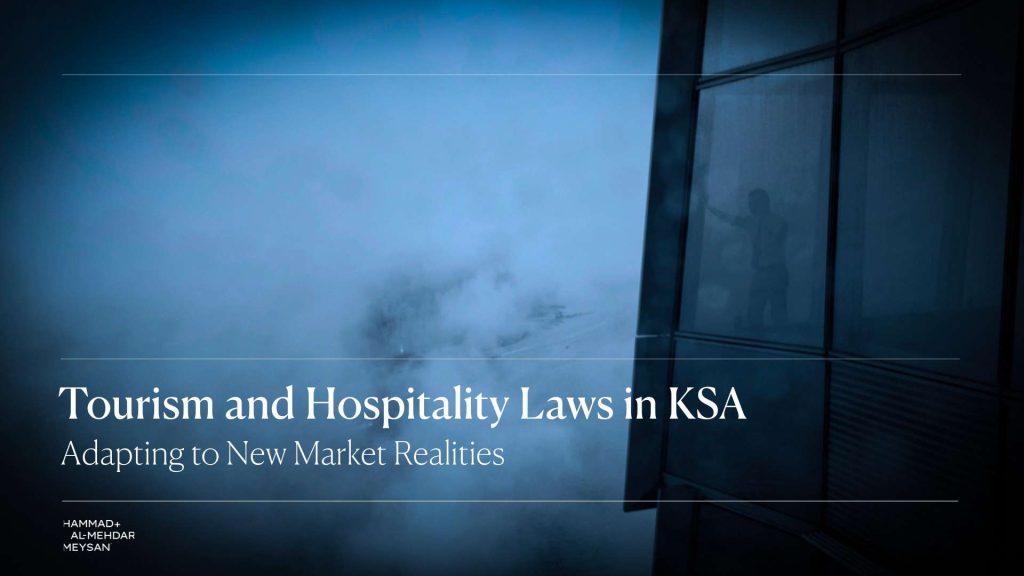
Saudi Arabia’s tourism and hospitality sectors continue to undergo transformative change, underpinned by the ambitious goals of Vision 2030. With the Kingdom targeting 150 million annual visitors by 2030—recently revised upwards from the earlier 100 million goal—tourism has emerged not just as a strategic sector, but as a national priority for economic diversification and global positioning. Legal and regulatory reform is central to enabling this ambition, and 2024–2025 has seen a wave of new policies and institutional enhancements aimed at making Saudi Arabia a competitive, world-class destination.
Modernising the Legal Framework
The evolution of the legal environment has been marked by the continued refinement of the Tourism Law and supporting regulations. Following the significant updates in 2022 and 2023, the Ministry of Tourism introduced new executive bylaws in late 2024 aimed at further streamlining licensing, improving classification systems, and ensuring international service benchmarks are met.
Most notably, the launch of the Integrated Licensing Platform (ILP) in 2025 enables end-to-end application and renewal processes for all tourism-related services, including accommodation, entertainment venues, transportation, and tour operations, under a single digital umbrella.
Foreign Investment and Private Sector Momentum
As of Q1 2025, Saudi Arabia has attracted over SAR 220 billion in cumulative tourism-related investments, including major joint ventures between global hotel chains and local developers. The legal framework now permits 100% foreign ownership in virtually all hospitality subsectors, including short-term rentals, eco-resorts, and heritage site management.
In parallel, the Tourism Investment Enabler Programme, launched in 2024, provides a bundled legal and financial facilitation service for new entrants, jointly operated by the Ministry of Investment and the Tourism Development Fund (TDF). This initiative offers preferential zoning, PPP advisory services, tax incentives, and fast-track licensing for projects aligned with national tourism zones, such as the Red Sea Project, Diriyah Gate, and NEOM.
Sustainability, Culture, and Responsible Development
Sustainability remains a legal imperative, not just a policy aspiration. Developers of large-scale tourism projects must now secure the mandatory Green Construction Compliance Certification—an environmental framework introduced in early 2025 that requires alignment with carbon neutrality targets and local biodiversity standards.
Additionally, a new Cultural Heritage Protection Law, enacted in 2024, gives enhanced enforcement powers to the Royal Commission for AlUla and the Heritage Commission, ensuring that both tangible and intangible heritage are preserved amid rapid development. The law mandates cultural impact assessments for projects near heritage sites and requires developers to work with licensed cultural consultants.
Navigating Regulation: New Challenges in a Maturing Market
While legal reforms have brought transparency and accessibility, the regulatory environment remains complex, particularly due to overlapping mandates from regional municipalities, GACA (for aviation-related services), and sector-specific authorities. Businesses must now adhere to updated compliance regimes covering:
- Data privacy (aligned with the new Saudi Personal Data Protection Law, effective March 2025)
- Tourism-specific labour laws and Saudisation ratios
- Safety protocols linked to AI-driven surveillance in public entertainment venues
- Gender integration policies for resorts, spas, and F&B outlets
A key change in 2025 is the expanded use of Compliance Dashboards, which all licensed operators are required to maintain and submit quarterly to the Ministry of Tourism, covering metrics on service quality, environmental impact, and national employment.
Talent Development and Saudisation 2.0
In response to the growing demand for skilled human capital, 2025 has seen the rollout of Tourism Academy KSA, a national public-private initiative launched in partnership with global hospitality schools and powered by the Human Capability Development Program.
Meanwhile, Saudisation mandates have been recalibrated under Saudisation 2.0, focusing not just on headcount quotas but on career progression, retention, and skill development. New compliance rules require hospitality operators to demonstrate that at least 50% of front-facing managerial roles are held by Saudi nationals by 2026, with fines for non-compliance now tied to profitability rather than flat rates.
Outlook: Navigating 2025 and Beyond
Saudi Arabia’s legal and regulatory ecosystem for tourism is becoming more sophisticated, structured, and investor-friendly. With the Kingdom now positioning itself as a leader in sustainable, culturally rich, and tech-enabled tourism, the role of law has shifted from a gatekeeping function to an enabling force.
Operators, developers, and investors must remain agile, aligning not only with current requirements but also anticipating the direction of legal and policy evolution. Regulatory foresight, strategic localisation, and digital compliance integration will be essential in navigating this high-growth, high-reward environment.
As Vision 2030 enters its most critical phase of execution, the tourism sector stands as a global case study of how law, policy, and ambition can converge to reshape a nation’s identity on the world stage.
